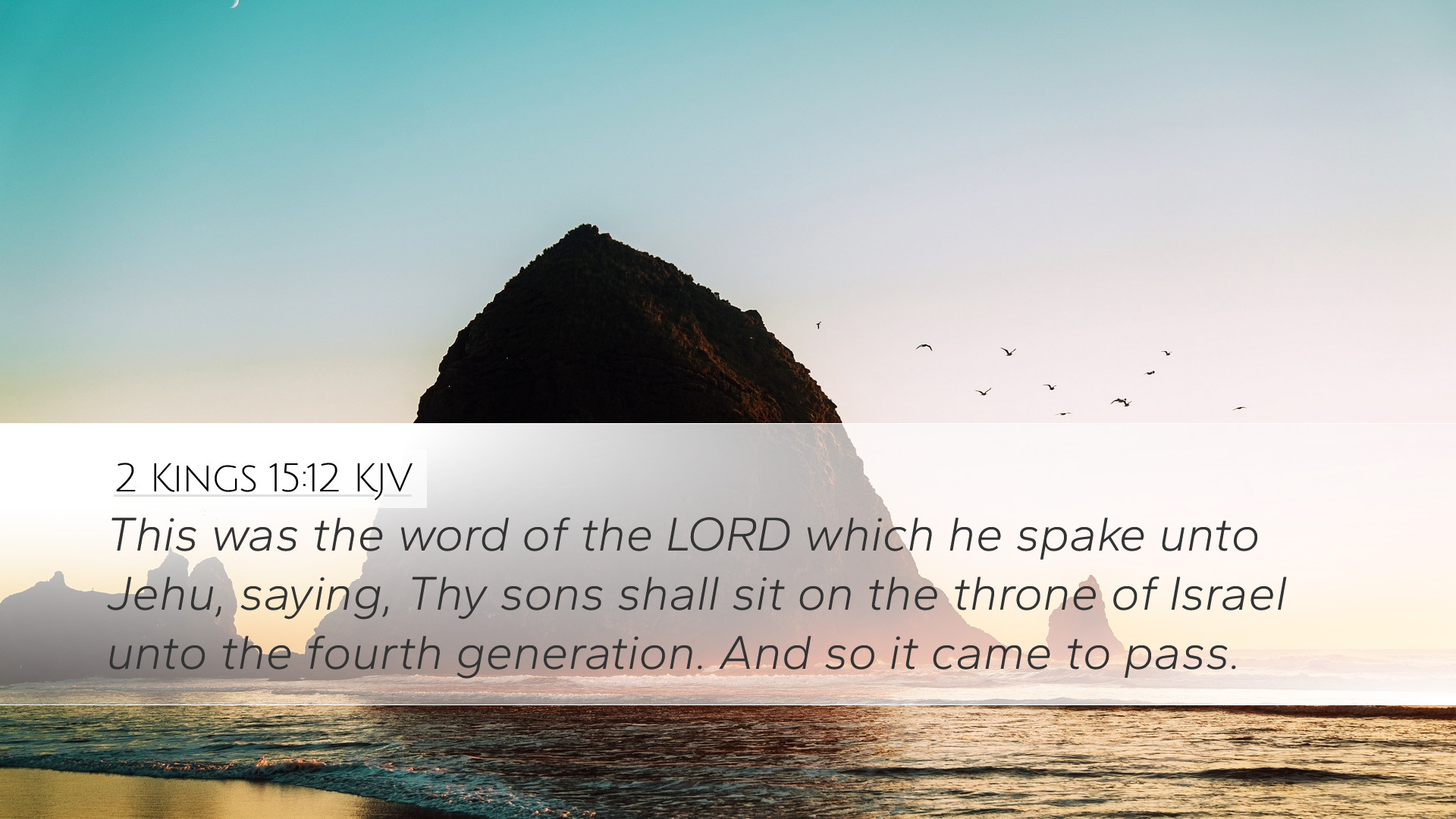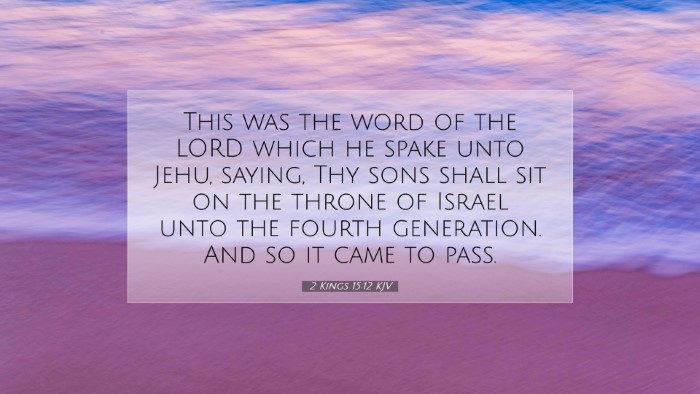Commentary on 2 Kings 15:12
Verse: "This was the word of the Lord which he spake unto Jehu, saying, Thy sons shall sit on the throne of Israel unto the fourth generation. And so it came to pass."
Introduction
2 Kings 15:12 encapsulates a pivotal moment in the historical narrative of Israel, linking the prophetic promise to Jehu with the unfolding of Israel's royal lineage. This commentary draws from insights offered by notable public domain commentators such as Matthew Henry, Albert Barnes, and Adam Clarke to explore the theological and historical significance of this verse.
Theological Significance
Divine Sovereignty: The assertion that the lineage of Jehu would endure for four generations underscores God's sovereignty in establishing and maintaining authority. Henry emphasizes that this promise illustrates God's control over the affairs of nations and His faithfulness to His word. The specificity of 'four generations' not only signifies longevity but also highlights God's ability to dictate the terms of succession in Israel's monarchy.
Fulfillment of Prophecy: Albert Barnes notes that the prophecy given to Jehu finds its fulfillment in the text itself, affirming that God's Word will come to pass. This aspect is crucial for understanding God’s interaction with Israel — He not only speaks but also ensures that His decrees are realized in history. This reinforces the faith of believers in the reliability of Scripture.
Historical Context
Jehu, the son of Jehoshaphat, was anointed king of Israel to purge the land of Baal worship, which had infiltrated Israel's practices. Adam Clarke highlights that this historical backdrop is essential for appreciating the significance of God's promise to Jehu's descendants. By eliminating the idolatrous influences, Jehu established a period of righteous leadership that was critical for Israel's identity as God’s covenant people.
Jehu’s Legacy
- God’s Instrument: Jehu is portrayed in Scripture as an instrument of God's judgment, fulfilling the prophecy concerning the house of Ahab. His decisive actions were a direct response to the moral decay within Israel.
- Theological Implications: Clarke notes that while Jehu carried out God’s will, his own personal failings were evident in his partial adherence to Yahweh, reflecting a complex character who achieved divine purposes despite his shortcomings.
- Historical Impact: The promise of dynastic stability through Jehu's descendants had implications for Israel's political landscape. It ensured that there would be a continuity of leadership that could respond to both internal and external challenges.
The Nature of God's Promises
The promise to Jehu illustrates a fundamental aspect of God's covenant nature. As Henry remarks, God's promises are often conditional but can be unconditional concerning divine decrees. In this case, the promise was unconditional in that Jehu’s household would rule, establishing a monarchy that would face its trials but remain within the framework of divine intent.
Conditions and Consequences
- Faithfulness Required: While God’s promise was clear, the continuation of such blessings hinged upon the faithfulness of Jehu and his descendants to adhere to God's commands. This ties into the broader biblical narrative where the fate of nations often hinges on the loyalty of leaders to God.
- Reflection on Stability: The passage prompts reflection on the stability of leadership in relation to spiritual integrity. When rulers promote righteousness, the people benefit, but failings can lead to significant consequences, as seen in the subsequent decline of the Northern Kingdom.
Application for Today
This verse serves as a reminder to contemporary believers, theologians, and church leaders regarding the importance of adhering to God’s covenant. It reflects both the fulfillment of God’s promises and the serious nature of leadership responsibilities.
- Encouragement in Leadership: Pastors and leaders are encouraged to look at Jehu’s example, seeing that while God may use imperfect vessels, the overarching purpose is to foster a legacy of righteousness.
- Call to Faithfulness: There remains a call for faithfulness among followers of Christ to proclaim and uphold God’s truth in all aspects of life, acknowledging that personal and communal conduct significantly impacts God’s blessing.
Conclusion
2 Kings 15:12 serves as a pivotal verse that reflects God's sovereign will and the intricate relationship between divine promise and human action. Through the commentary, we see the interplay of history and theology, urging us to consider the weight of God's promises in our lives and the lives of our communities today.


